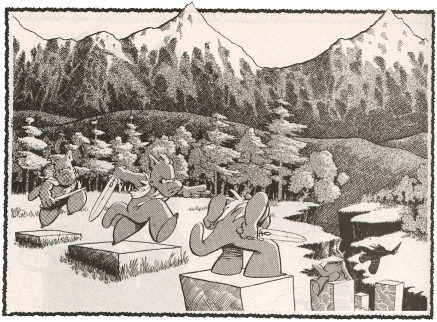

| June 1996 |
|
Yes, I know, I reviewed Cerebus last month. But, muchacho, Bob is not going to read 1220 pages of comics just to add to a bullet point.
| Dave Sim: Church & State | |
In a recent Comics Journal interview, Dave Sim complains about the use of the term 'graphic novel' for a mere 60 or 100 page story, pointing out for instance that Marvel has issued a set of science fiction 'graphic novels' that adapted sf short stories. How did a short story become a novel by adding (juxtaposed sequential) pictures to it?
Sim has a point, since he (and not many others) have written what really are comic book novels. The first, High Society, at 500 pages, was fun, but rather episodic in form, like a Dickens novel. In the second, the 1220-page Church & State, which follows Cerebus' ascent through politics, religion, and the spirit world, Sim really masters the unprecedented long form comic.
 It's a much more satisfying work than High Society: more unified, more serious. Above all there is more of a sense of personal vision. This time Estarcion has enough personality of its own to seem real: we see what the factions stand for, grasp the consequences of a victory on this side or the other. And though Cerebus remains pretty much a misanthropic, greedy, self-pitying bastard, he has a couple glimmers of soul, and Sim allows some real moral vision to shine through (especially in the final confrontation with Astoria).
It's a much more satisfying work than High Society: more unified, more serious. Above all there is more of a sense of personal vision. This time Estarcion has enough personality of its own to seem real: we see what the factions stand for, grasp the consequences of a victory on this side or the other. And though Cerebus remains pretty much a misanthropic, greedy, self-pitying bastard, he has a couple glimmers of soul, and Sim allows some real moral vision to shine through (especially in the final confrontation with Astoria).
Putting aside the theocratic politics, for Sim religion is basically ethics and cosmology. No one has a personal relationship with Tarim here, no one prays except to plea for favors, no one seeks (or achieves) enlightenment. C&S is evidently the reflections of someone who's observed religion from outside, trying to explain such a strange phenomenon-- not those of someone who's ever tried to live a religion from the inside. (I don't say this is good or bad; it's just an observation.)
Cerebus' program on becoming Pope-- demanding that everyone in Iest give him their gold-- is of course an absurdity. I think the story works anyway, perhaps because it can be read symbolically: leaders do do things about that foolish or greedy, after all; and it brings up the issues of faith and power, and shows Cerebus' escape from his handlers, as well as any more realistic scenario could.
I shouldn't make the book sound heavier than it is; the book is full of comedy, from the appearances of the Roach (Wolveroach and the Secret Sacred Wars Roach), to the always amusing Lord Julius, to an anachronistic portrait of Mick Jagger and Keith Richards.
About my only complaint about the book is that it has one or two too many dream sequences. I could have done without the drinking chapter. And Sim's cosmology doesn't do much for me, but then cosmology never does. The creation of a planet is always interesting, but what is there to say about the creation of the universe? Before: void. After: galaxies, and more hydrogen than we know what to do with. So?
Both Sim's attacks on women and on feminism from the pulpit of his editorial pages (his pointless baiting of Friends of Lulu, for instance), and the comic itself, show that the concept of powerful, independent women has a strange attraction and repulsion for Sim. Jaka, Astoria, Michelle, and Cirin are the immovable points in Cerebus' life: cold, calm, competent women, pursuing inscrutable programs of their own. Judging from the comic, Sim doesn't have a higher view of men (and, curiously given Sim's attacks on feminism, he obviously understands and deplores the way men have historically treated women). Sim's men can be incredibly venal; but they are rarely complex; indeed, most of them are Dickensian stereotypes. A few of the women operate this way (e.g. Red Sophia and her mother), but I can't think of any male characters as deep as Astoria. (Oscar, perhaps; I haven't read that far.) Weisshaupt is similarly suave and calculating, for instance, but that's all he is; there's more to Astoria. Lord Julius is a delicious mixture of surface comedy and political genius, but he isn't much more than that contradiction, either.
| Sarah Dyer: Action Girl | |
Action Girl is an all-female anthology comic edited by Sarah Dyer, featuring comics that are "girl-positive and female-friendly-- but never anti-boy."
Like most anthologies, this one is uneven, but some of the artists are definitely worth watching. I can't get enough of Elizabeth Watasin, for instance, and Patty Leidy's work is a lot of fun; I also liked pieces by Rebecca Dart, Leanne Franson, and Jessica Abel. Dyer's own work and prose tends to the cute (what can you say about someone who describes herself as a Sanrio addict?), but her basic philosophy-- practical, small-scale action-- is completely right on.
There should be more of this kind of thing, which is why you should go get the next issue, which should be out by now.
